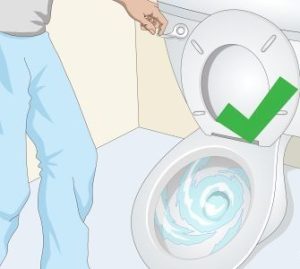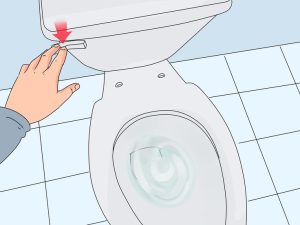What Liquids Unclog Toilets?
Several options exist for unclogging toilets! For minor clogs, try:
- Dish soap & hot water: Let soap sit for 15 minutes, then pour hot water to dislodge the clog.
- Baking soda & vinegar: Mix 1 cup baking soda with 2 cups vinegar, creating a fizzing reaction that can break down clogs. Let it sit for 30 minutes before adding hot water.
For tougher clogs, consider:
- Plunger: Use a forceful plunge to dislodge the blockage.
- Commercial drain cleaner: Use as directed, but be cautious of harsh chemicals and potential pipe damage.
Common Household Liquids
Before diving into specific solutions, let’s take a look at some commonly used household liquids for unclogging toilets. These include vinegar, baking soda, hot water, dish soap, Epsom salt, Coca-Cola, hydrogen peroxide, liquid dishwasher detergent, enzyme-based cleaners, and chemical drain cleaners. Each of these liquids possesses unique properties that may help dislodge and dissolve toilet clogs. Also, read about How to use a plunger
Vinegar and Baking Soda
A popular natural remedy for unclogging toilets involves a combination of vinegar and baking soda. This method works by creating a foaming reaction that can help break down debris and clear minor clogs. To use this solution, pour a mixture of vinegar and baking soda into the toilet bowl, allow it to sit for several hours or overnight, then flush with hot water.
Hot Water
Simple yet effective, pouring hot water into the toilet bowl can help soften and dislodge clogs, particularly those caused by organic matter like toilet paper. Care should be taken to avoid using boiling water, as it can crack porcelain bowls. Instead, use hot water from the tap or heat water to a safe temperature before pouring it into the toilet. For more information visit our website urbansoutfitter.com
Dish Soap
Dish soap can serve as a lubricant to help loosen stubborn clogs and facilitate their removal. Simply squirt a generous amount of dish soap into the toilet bowl, followed by hot water. Let the solution sit for a few minutes before attempting to flush the toilet. This method may be particularly effective for greasy clogs.

Epsom Salt
Epsom salt, known for its muscle-relaxing properties, can also be used to unclog toilets. Add a cup of Epsom salt to the toilet bowl and let it sit for several hours or overnight. The salt will help break down the clog, making it easier to flush away.
Coca-Cola
Surprisingly, Coca-Cola has been touted as a remedy for unclogging toilets due to its acidic nature. Pouring a can of Coca-Cola into the toilet bowl and allowing it to sit for an hour or more can help dissolve stubborn clogs. However, this method may not be suitable for all types of clogs and should be used with caution.
Hydrogen Peroxide
Hydrogen peroxide is another household item that can effectively break down toilet clogs. Pouring a cup of hydrogen peroxide into the toilet bowl and letting it sit for some time can help dissolve organic matter and clear minor obstructions. Be sure to use a diluted solution and avoid mixing hydrogen peroxide with other cleaning products.
Liquid Dishwasher Detergent
Liquid dishwasher detergent can be a surprisingly effective solution for unclogging toilets. Squirt a generous amount of detergent into the bowl, followed by hot water. Allow the mixture to sit for a while before attempting to flush. The detergent’s cleaning agents can help break down waste and debris, allowing for easier flushing.
Enzyme-based Cleaners
Enzyme-based cleaners are designed to break down organic matter, making them effective for clearing toilet clogs caused by waste and toilet paper buildup. These cleaners work gradually and may require several applications for stubborn clogs. Follow the manufacturer’s instructions for the best results.
Chemical Drain Cleaners
While chemical drain cleaners can be powerful against tough clogs, they should be used with caution due to their harsh ingredients. These cleaners can damage plumbing and pose risks to human health if not handled properly. Use chemical drain cleaners as a last resort and follow all safety precautions.
Homemade Solutions
For those who prefer natural alternatives, there are several homemade solutions for unclogging toilets. These may include combinations of vinegar, baking soda, lemon juice, and other household ingredients. While generally safe, be mindful of any allergies or sensitivities to certain ingredients.
Professional Assistance
In cases of severe clogs or underlying plumbing issues, it may be necessary to seek professional assistance. A licensed plumber can assess the situation and recommend the best course of action, whether it involves snaking the drain, repairing damaged pipes, or replacing components.

Preventive Measures
To avoid future toilet clogs, consider implementing preventive measures such as using less toilet paper, avoiding flushing non-flushable items, and scheduling regular maintenance checks. Simple habits like keeping a plunger handy and addressing minor clogs promptly can help prevent larger problems down the road.
Conclusion
In conclusion, a variety of liquids can be effective for unclogging toilets, ranging from household staples like vinegar and baking soda to unexpected solutions like Coca-Cola. When faced with a clog, it’s essential to choose the right method based on the nature and severity of the obstruction. Remember to prioritize safety and use caution when handling chemicals or performing DIY repairs.
FAQs
Can I use bleach to unclog my toilet?
While bleach may help disinfect the toilet bowl, it’s not recommended for unclogging purposes. Bleach is a harsh chemical that can damage plumbing and may not effectively break down clogs.
What should I do if none of these methods work?
If traditional methods fail to clear the clog, it’s best to contact a professional plumber. They have the tools and expertise to tackle even the toughest obstructions safely and effectively.
Is it safe to mix different cleaning products when unclogging a toilet?
No, mixing cleaning products can produce harmful fumes and pose serious health risks. Stick to one method at a time and avoid combining chemicals.
How can I prevent toilet clogs in the future?
To prevent future clogs, avoid flushing large amounts of toilet paper at once and refrain from flushing non-flushable items like wipes and sanitary products. Regular maintenance and prompt attention to minor clogs can also help.
Are there any eco-friendly alternatives for unclogging toilets?
Yes, several eco-friendly options, such as vinegar, baking soda, and enzyme-based cleaners, are effective for unclogging toilets without harsh chemicals. These alternatives are safer for both the environment and your plumbing.
